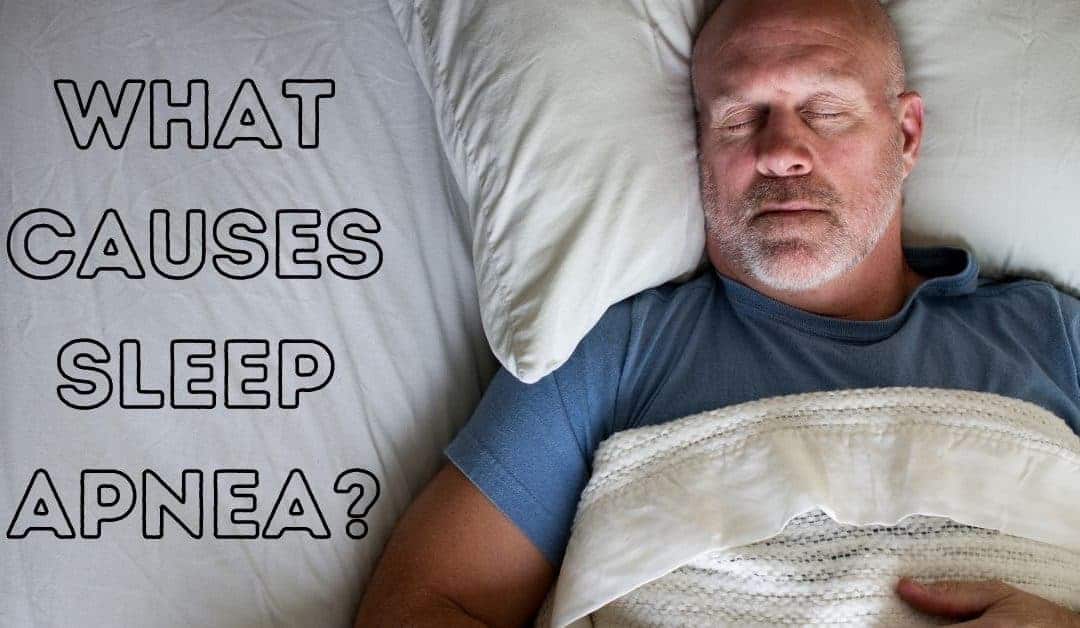Are you having a hard time sleeping through the night? Does your partner complain about loud snoring? Or perhaps you’ve been waking up in the middle of the night feeling like you can’t breathe. Sleep apnea is a sleep disorder that makes it impossible for you to sleep soundly through the night. There are several types of sleep apnea, and several causes of this sleep disorder.
The Types of Sleep Apnea
There are three main types of sleep apnea. All three will cause your breathing to stop throughout the night, and you’ll wake up briefly to restart your breathing. You may not notice waking up during the night, but you’ll feel exhausted during the day and struggle with fatigue.
The three types of sleep apnea are:
- Obstructive sleep apnea – This is the most common kind of sleep apnea. It’s caused by your throat muscles relaxing and blocking your airway during sleep.
- Central sleep apnea – This sleep apnea originates in the brain. It happens when the brain isn’t sending signals to your muscles, so your body isn’t receiving the right signals telling it to breathe.
- Complex sleep apnea syndrome – The third kind of sleep apnea is a combination of both obstructive sleep apnea and central sleep apnea.
Recognizing the Symptoms of Sleep Apnea
Both obstructive sleep apnea and central sleep apnea have similar symptoms. This can make it hard to know what kind of sleep apnea you have. Some of the symptoms of sleep apnea include:
- Snoring
- Periods during the night when you stop breathing
- Waking up feeling like you’re choking
- Gasping for air during sleep or when you wake in the night
- Having a dry mouth in the morning
- Morning headaches
- Insomnia
- Daytime fatigue
- Feeling easily frustrated or irritable
If you have several of these symptoms, you likely have sleep apnea. If you think you have sleep apnea schedule a visit with your doctor or ENT to learn more about sleep apnea.
What Causes Sleep Apnea?
Obstructive sleep apnea: The most common kind of sleep apnea is obstructive sleep apnea. It’s caused by an over relaxation of the muscles in your neck and throat. These muscles support your airways, and they stay engaged during the night to keep your airway open. If you have obstructive sleep apnea, these muscles are overly relaxed, and they can block the airway. Your breathing will stop for a moment and your blood oxygen levels will decrease. As soon as your brain realizes this, it sends a signal to wake you from sleep and tighten the muscles in your throat to restart the airflow. This can happen up to 30 times every hour all night long, preventing you from getting a good night’s sleep.
Central Sleep Apnea: The second type of sleep apnea is caused by the brain rather than the muscles. Central sleep apnea occurs when your brain doesn’t send the right signals to the muscles that control your breathing. For a few moments you stop breathing. This causes you to wake up with a shortness of breath or gasping for air.
Risk Factors for Sleep Apnea
Sleep apnea affects millions of Americans. There are a number of risk factors that can increase your chances of developing sleep apnea. Some of the risk factors for sleep apnea include:
- Obesity: This will greatly increase your risk of sleep apnea. Having deposits of fat around your neck and throat can lead to an increased risk of an obstructed airway.
- Genetic factors: If you have a narrow throat or large tonsils you will have a higher risk of sleep apnea.
- Gender: Men are twice as likely to have sleep apnea than women, so your gender can increase your risk of sleep apnea.
- Age: Older adults are more likely to have sleep apnea than younger adults.
- Alcohol intake: Excessive drinking can affect the muscles in your throat. Alcohol can relax the muscles and block your airway.
- Smoking: People who smoke have a higher risk of developing sleep apnea.
- Stroke: If you’ve had a stroke, you have an increased risk of developing central sleep apnea.
Treating Sleep Apnea
Do you think you may have sleep apnea? Visit us at Enticare to learn more about sleep apnea and explore your treatment options.

